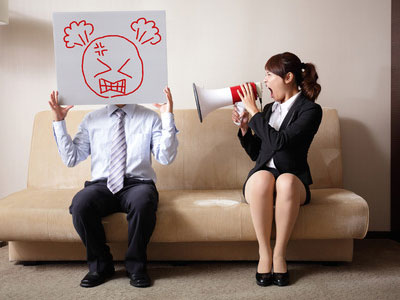Learning To Deal With Toxic Individuals
If, as many teachings suggest, there is spiritual growth in every experience, and in particular the more difficult times, then being strongly affected by another person’s negative behavior must also be one of life’s lessons.
I have been pondering this because of the increase in psychic reading calls I have been getting related to this very topic. Some of my clients have been profoundly upset lately by the negative outbursts of people in their lives, including family, friends, partners, work colleagues, or even random altercations in public places.
I love these words from the poem Desiderata: “Avoid the loud and the aggressive – they are vexations to the spirit.” How very true. However, more often than not, we are not in the position to avoid those individuals altogether, in order to escape their toxic influence. Even in a friendship turned sour, we often want to give the toxic friend the benefit of the doubt, knowing that they don’t always behave that way. We might even be in love with a negative person, hoping we can change them one day.
You are the light. The light that is the observer of the shadow. Take some time to sit with this, meditate, contemplate, and develop your strength of being light ~ Pat Rodegast
In my own experiences with toxic individuals, I found that applying some bits of advice I have come across over the years, helps me to better deal with these situations. My best survival tool has been to do my utmost to become only the ‘observer’ of their drama and negativity, as opposed to being the witness.
Once, when I was describing the toxic behavior of a close family member to a friend, he said that I should try to see their bitterness and anger simply as them “expressing their own discomfort inappropriately.” Beautifully put, and it also has helped me at times to see past their rage and to consider their deep-seated pain, which could lie behind their drama.
As a consequence, that same family member I had become so upset about, did eventually agree to seeing a healer, who helped him find some peace during the last few months of his life. The healer also advised me to see past the bitterness and anger devouring my loved one, and see through to the “true spiritual essence of him as a sick person.”
I know there has to be a lesson for us in being the receiver of a negative onslaught. I used to make excuses for other people’s behavior. So, I guess, in a way, I was enabling them. I try my best now to imagine myself standing back, as if I were in a spectator’s box in a theater, viewing the drama going on upon the stage from afar.
I eventually realized that my own insecurities were being set off by others – a process which actually had absolutely nothing to do with me! Perhaps the lesson was for me to get to that ‘aha moment,’ and to come to terms with my own deep-seated ‘stuff,’ in order that I might help my customers with theirs. I was learning to loosen the hold that other people’s drama was having on me.
Anger is an uncontrollable feeling that betrays what you are when you are not yourself. Anger is that powerful internal force that blows out the light of reason ~ Ralph Waldo Emerson
My clients will sometimes ask if the ‘troubled’ person in question is bipolar, psychopathic, narcissistic, and so on. But I am not in a position to impose psychiatric labels on other people. Such troubled individuals will always think they are right, or being taken advantage of. They tend to create a sense of urgency. Their charged emotions often lead us to feeling responsible for their state or predicament, and that we need to fix a situation or circumstance for them. But nothing is really that urgent!
Not everyone is affected to the same extent when another person throws their ‘toys out of the crib,’ but you will know you are affected by someone’s tantrum when your heart races, your gut feels like it’s flipping over, your face is flushing, or you feel shaky and shocked. When such a situation comes about suddenly, focus on your breathing, and try and be in the moment, as you visualize being the observer from a distance.
Not responding to a toxic individual’s drama by trying to placate them, and asking questions or arguing, is a skill worth working on. When we see this kind of upsetting situation as a challenge, and that a big part of the solution is in learning not to react (thus feeding the situation), then we are moving closer to creating those more harmonious situations we really do wish to achieve.
|
|


Leave a Reply